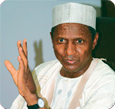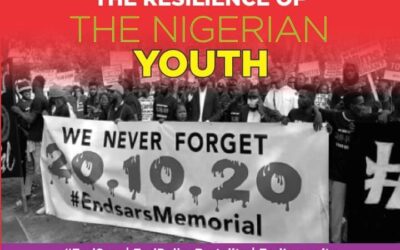President Umaru Yar’Adua on Tuesday insisted that his administration would not shield any corrupt Nigerian from prosecution no matter how highly placed.
The President, who spoke at a national seminar by the Economic and Financial Crimes Commission in Abuja, said the high level of corruption in the country must not be tolerated anymore.
The Yar’Adua administration had been accused in some quarters of not willing to prosecute some former governors, especially those close to the Presidency.
Some of such ex-governors said to be close to the Presidency are Chief James Ibori(Delta) and Chief Lucky Igbinedion(Edo).
But at the seminar titled, “Creation and Management of National Wealth for Common Good,” Yar’Adua said,” “Let it be clear to all that no one, irrespective of assumed or real status, who is proved to be corrupt, will receive protection from this administration.”
He listed corruption and disrespect for the rule of law as the biggest impediments to Nigeria’s development and called on states and local governments to collaborate with the Federal Government in entrenching a corruption-free system of government in the country.
The President said, “The high level of corruption in our country requires a tough, sustained and concerted approach. State and Local Governments must be fully committed to instituting and implementing anti-corruption programmes that will permeate the grass roots.
“We must, individually and collectively, take a stand against those vices which have circumscribed our national growth and development.
“The fight against corruption is one which we must all be committed to. Our obligation to our collective posterity makes this a mandatory duty. We cannot afford to fail.
“A major plank of our commitment to national renewal is the uncompromising anti-corruption campaign. We are running an administration that makes zero-tolerance for corruption in all its ramifications the cardinal principle of governance.
“Corruption and disrespect for the rule of law, which feed on and reinforce each other, in my estimation, remain the biggest impediment to our quest for sustained growth, development, peace, stability, and security.”
He said the Federal Government had already begun the process of strengthening all the law enforcement agencies and regulatory authorities to make them more responsive to the yearnings of ‘our people.’
Yar’Adua, who noted that Nigeria was many years behind its peers at independence in 1960, called for sober assessment, especially in the light of its enormous potential.
He said, “It is self-evident that we are far from the Nigeria which we hope to bequeath to our posterity with pride and a sense of fulfilment.
“As we tell ourselves the truth and face up to the inherent challenges, we should resolve to begin to do those things which will steer us in the assured path of growth and development.
“It is only through honest, sincere, selfless, and God-fearing leadership that we can hope to build a truly great nation which will be reflective of the great potential with which Almighty God has endowed Nigeria .
“We can only build trust between the leadership class and the governed through governance imbued with transparency, accountability and credibility.”
He said the country cannot effectively tackle its developmental challenges and take advantage of the opportunities offered by the emerging globalised economy, ‘if our governments and political processes are corrupted and contaminated.’
“We must, individually and collectively, take a stand against those vices which have circumscribed our national growth and development.” Yar’Adua advised.
He said that the seminar was in tandem with his administration’s desire to deliver tangible value to Nigerians , through diligent and prudent management of the nation’s resources.
The President said, “You will recall that in my inaugural address to the nation, I stated that we would focus on laying the necessary framework for wealth creation and set new benchmarks for effective utilisation of national resources. I remain committed to that resolve.
“The level of poverty in our society today, which should constitute a nagging sore on our collective conscience, is a direct consequence of our failure to do those things which should have helped us optimise our abundant human and natural resource potential.
“A stark choice lies before us as a nation and a people. Do we want to perpetuate the antecedents of planlessness, endemic corruption, and disrespect for the rule of law and due process – a situation that has grievously contaminated and compromised our growth and development?
“Or, do we resolve to go down the path of national regeneration by entrenching good governance founded on the ideals of good, patriotic leadership; the pre-eminence of the rule of law; equity, justice and the fear of God? If we must progress, we must radically change our conduct and attitudes as a people.”
Yar’Adua had on August 7 assured Nigerians that his government would not provide any safe haven for corrupt ex-governors and public office holders.
His Special Adviser on Communications, Mr. Olusegun Adeniyi,who spoke for him, had said, “The President will never provide any safe route for anyone, no matter how highly placed.”
Also at the seminar, the Executive Director of the United Nations Office on Drugs and Crime, Mr. Antonio Maria Costa, said that Nigeria lost close to $400bn between 1960 and 1999 to corruption.
Costa, who blamed the crises in the Niger Delta on corruption, said the amount could have been used to provide infrastructural facilities in the country.
He said, ”Your country used to be notorious for corruption. Nigeria lost billions of dollars – the livelihoods of millions of people – to foreign havens, stolen and expatriated by corrupt leaders.
”By some estimates, close to $400bn was stolen between 1960 and 1999. The late Gen. Sani Abacha alone is estimated to have stolen the equivalent of two to three per cent of the country‘s GDP for every year that he was the Head of State.
“That stolen money is staggering – almost unimaginable. Indeed, it is astronomical because if you were to put $400bn bills in a row, you could make a path from here to the moon and back; not once but 75 times.
”Think of the millions of vaccinations that could have been bought; the thousands of kilometres of roads that could have been paved; the hundreds of schools, hospitals and training centres that could have been built with such money.”
Costa also observed that corruption has had devastating effects on millions of Nigerians and other Africans.
He said, ”Corruption kills, literally, through counterfeit medicines, by bribes paid to security officials that enable terrorist attacks; it kills trust in government, public institutions, and companies.
”As corruption spreads, foreign investment dries up or is driven away, poverty deepens, and public discontent grows. As a result, society becomes even more vulnerable to corruption, crime, bad governance, and poverty.
“There is even the risk of violence and serious damage to the environment – look no further than the Niger Delta.”
He noted that the level of corruption in Nigeria was declining primarily due to the activities of the EFCC.
Costa said, “Nigeria is benefitting from climatic change in attitudes, laws and measures against corruption. These days, Nigeria is cited as a good example of how to build integrity in politics and business.
”Your anti-corruption broom has swept even high officials from office for stealing the public‘s money. UNODC is proud to work with the most successful agency in Africa in order to strengthen integrity and accountability in Nigeria, and set an example for the rest of the world.”
He described integrity, strong political leadership, public intolerance for graft and open media as some of the greatest preventive measures against corruption.
The Chairman of the EFCC, Mallam Nuhu Ribadu, had earlier described the forum as a platform for participants to ‘ seriously reflect on the nation’s chequered journey of discovery and the foundation of her regeneration.
He said, “We are at the junction of many enthralling and uplifting moment in the history of our nation as it grapples with the challenge of ethical rebirth.”
Ribadu said that the fight against corruption and other economic crimes must not only be vigorous but sustained if the nation was to attain its Vision 2020 agenda.
By Ihuoma Chiedozie and Oscarline Onwuemenyi
The Punch
Wednesday, November 14, 2007




